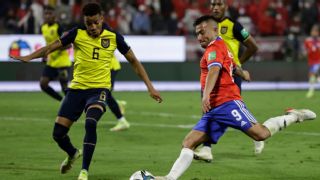|
Chile shot themselves in the foot on the road to the 2018 World Cup in Russia. They missed out on fifth place, the playoff spot, by the narrowest of margins. Finishing level on points with Peru but behind on goal difference. And so they had to watch the Peruvians beat New Zealand to claim the final place for Russia -- knowing all the time that it was all their own fault. During the course of that qualification campaign, Chile were held to a 0-0 draw by Bolivia, who, for the last few minutes, brought on defender Nelson Cabrera. Born in Paraguay, Cabrera had recently been naturalised by Bolivia. But there was a problem. He had been living in the country for three years -- enough for Bolivian law. - MLS, LaLiga, Bundesliga on ESPN+: LIVE games, replays
- Soccer on ESPN+: FC Daily | Futbol Americas
- Don't have ESPN? Get instant access But FIFA regulations required a five-year period of residence. Cabrera, then, was ineligible. He should not have been on the field. Chile launched an official protest, won their case and were awarded a win. But this was a Pyrrhic victory because Cabrera had also come off the bench in the previous round, when Bolivia had beaten Peru 2-0. Peru were also awarded a win. So they were handed three extra points. Chile, who had drawn their match with Bolivia, could only get two more. And that extra point was enough to lift Peru above Chile into fifth place. So when reports emerged that an alleged ineligible player had featured in the 2022 qualifiers, Chile were careful about doing the arithmetic. The player in question is Byron Castillo, right back in an Ecuador side which qualified for the 2022 World Cup in Qatar with a round to spare -- and who are set to take on the hosts on the opening day of the competition. The Chilean FA alleges that Castillo was born in Colombia and not eligible to represent Ecuador. If that were true and if the points from the eight Ecuador matches that Castillo appeared in (including two against Chile) were to be reallocated, then Chile, who finished seventh, would climb to fourth and be awarded an automatic slot in Qatar. "All this is obviously well known by the FEF [Ecuadorian Federation]," the Chilean federation said in a statement released on May 4. "The football world cannot close its eyes to so much proof. These serious and irregular practices in the registration of players cannot be accepted, especially when we are talking about a world competition." The Ecuadorian FA dismissed the claim in what it said were "unfounded rumours" designed to destabilise the squad by those who want to prevent its participation in World Cup. "We must be emphatic [and state] that Byron Castillo is Ecuadorian for all legal effects," the Ecuadorian FA said in a statement the next day. FIFA confirmed that it had received Chile's complaint but did not offer further comment on the matter. And Castillo himself seemingly mocked Chile's allegation, posting on Instagram over the weekend images of himself in action with Ecuador with a series of emojis that inferred that the World Cup can be seen on television. Ecuador, together with Brazil, has had a problem in recent years with player documentation. This has mainly been down to age alteration -- typically by unscrupulous agents falsifying documents to make players seem younger than they really are, and therefore gain an unfair advantage in age-limit competitions. Outstanding performances in Under-17 or Under-20 football can obviously help launch a career. Doubts have long surrounded Castillo. Ecuadorian side Emelec club made it public in 2015 that they would not complete a transfer for him because they were not sure about his documents. Two years later he was cut from the national Under-20 side because his real age was in question. Chile's FA alleges that Castillo has been playing with false papers that distort his real age. The matter of his age is of no relevance to the case, however. Unlike youth tournaments or the Olympics, the World Cup is not a competition with age restrictions. The only thing that matters is the question of nationality. The Ecuadorian FA made sure to tread carefully with Castillo. He was in fine form for Barcelona SC of Guayaquil, who last year made it all the way to the semifinals of the Copa Libertadores. In April of last year, the country's legal system carried out an investigation -- and concluded that Castillo was Ecuadorian. It seems that an older brother with a similar first name (Bayron), now deceased, may have been born in Colombia. But Byron was from Ecuador. With this decision, Castillo was brought into the squad, and made his Ecuador debut coming off the bench against Chile last September. This, then, is a case with different characteristics from that of Cabrera. Bolivia's error regarding Cabrera's case was an administrative oversight, while Ecuador can point to last year's investigation with respect to Castillo's situation. Moreover, while Cabrera fell down on lack of residency time, the same does not apply to Castillo. He has played his entire career in Ecuador, and is clearly a product of Ecuadorian football. There is a delicious irony here. Chile has been having huge problems developing players. They are still dependent on the ageing golden generation that won the Copa Americas of 2015 and 2016. The one new face to have made a recent impact was born in the English town of Stoke-on-Trent, plays for Blackburn Rovers and represented England at youth level. Ben Brereton was rebranded as Ben Brereton Diaz, incorporating the surname of his mother to represent the land of her birth. When he was called up for the first time for La Roja a year ago he did not even speak Spanish. In any real, concrete sense, Castillo is more Ecuadorian than Brereton Diaz is Chilean. But Chile hope that lawyers and authorities will see it differently.
|

